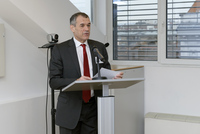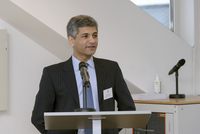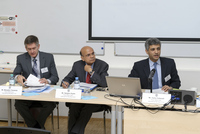Monday, March 18
Summary
On March 18, 2013, the JVI hosted a conference entitled “Designing Fiscally Sustainable and Equitable Pension Systems in Emerging Europe in the Post-Crisis World”, jointly organized by the International Monetary Fund’s Fiscal Affairs (FAD) and European Departments (EUR) to promote a wider discussion of policy challenges related to pension systems.
Following opening remarks by Carlo Cottarelli (Director, FAD) and Aasim Husain (Deputy Director, EUR), leading pension experts examined pension systems in emerging Europe with a focus on (i) the outlook for public pension spending; (ii) the impact of pension reform; and (iii) reform experiences. The conference concluded with a panel discussion of the policy options for achieving sustainable and equitable pensions in emerging Europe. The program and presentations can be found here.
In the first session, chaired by Sanjeev Gupta (Deputy Director, FAD), the overview presentation by Benedict Clements (Division Chief, FAD) showed that public pension spending had increased more in emerging Europe than elsewhere, accounting on average for about 10 percent of GDP and absorbing a large share of government spending, notwithstanding important cross-country differences. He cited higher replacement rates and aging populations as the key drivers of pension spending pressures. Other presenters (Aasim Husain; Anna D’Adidio, Economist, OECD; and Thomas Dominique, Chair, EU Social Protection Committee) noted that despite recent reforms in a number of countries, spending pressures could squeeze other priority spending, especially beyond 2030, as the old-age dependency ratio (the population 65 and older relative to the population aged 15-64) is projected to rise fast: for example, from 20 percent or less in 1990 in Poland, Hungary, Bulgaria and Lithuania to 35–50 percent by 2050.
Many countries have already implemented parametric adjustments and structural reforms to deal with rising public pension spending, but more needs to be done, as highlighted by speakers in the second session, chaired by Yusuf Altintaş (Head of Social Security Department, Treasury, Turkey). Sanjeev Gupta’s presentation provided an overview of pension reform options: raising retirement age, reducing replacement rates, and increasing payroll contributions or other revenues and the role of private sector pensions.
Igor Guardiancich (Fellow Collegia Carlo Alberto) discussed the political process which resulted in the structural pension reforms of the late 90s in Eastern Europe. The presentation also explored some of the reasons which may have led to the slowdown and, in cases, reversal of these reforms.
Jan Drahokoupil (Senior Research Fellow University of Mannheim) gave an assessment of whether structural reforms partially privatizing social security have actually met expectations in terms of diversifying away risks, ensuring acceptable returns, and keeping transition costs at a manageable level.
The presentation of Gregorio Impavido (Senior Economist, European Department, IMF) focused on the design and regulatory challenges facing mandatory private (2nd pillar) pension schemes and the manner in which some of these issues – the role and regulation of marketing, governance, controlling fees, promoting sufficiently diversified investment policies, among others – may be best addressed.
The third session, chaired by Alexander Lehmann (Lead Economist, EBRD), reviewed country experiences in more detail. Per Eckefeldt (Deputy Head of Unit, European Commission) reported on the Commission’s views on pension-related issues as set out in the 2012 and 2013 Annual Growth Surveys. Aligning the retirement age with increases in life expectancy, limiting access to early retirement schemes, supporting longer working lives, equalizing the pensionable age between men and women, and supporting the development of supplementary retirement savings schemes were of high importance. Mikhail Dmitriev (President, Center for Strategic Research); Róbert Iván Gál (Senior Researcher, TÁRKI Social Research); and Edgars Voļskis (Director, KPMG) focused more specifically on the cases of Russia, Hungary, and Latvia. Challenges with supplementary savings schemes point to the need for enhanced regulation, transparency in fee structures, and the need to find the right balance between diversifying long-term investments and avoiding excessive risk taking. The subsequent discussion highlighted the close link between pension reform and labor market reform, as an increase in the retirement age would need to be supported by labor market reforms that supported longer working lives.
The panel discussion, moderated by Carlo Cottarelli, focused on the policy options for achieving sustainable and equitable pensions in emerging Europe. The panelists—Lans Bovenberg (Professor, Tilburg University and Netspar); Agnieszka Chłoń-Domińczak (Assistant Professor, Warsaw School of Economics); Najat El Mekkaoui (Professor, University Paris Dauphine and Associate Researcher, Oxford University); and Robert Holzmann (Professor, University of Malaya) addressed the lessons from the financial crisis, the impact of reforms on fairness, the political economy of reforms, and the future role of public and private sectors in providing pensions. There was agreement among the panelists on the basic objective of public pensions, namely, to provide retirement income security within a sustainable fiscal framework. Equity considerations should play a key role for pension reform. Transition costs from moving to multipillar structures needed to be taken into account. However, while pension reforms that led to the introduction of mandatory private pensions improved the long-term sustainability of public finances, the diversion of contributions to mandatory private pensions had put pressure on budget deficits. The panelists concluded that in the context of looming fiscal pressures, pension reform would need to be an important component of countries’ structural reform agenda for the years to come, but the menu of critical reforms had to be country-specific, taking into account various factors, such as the status quo, demography, and political economy considerations.
Eugenia Shevtsova, Junior Economist













